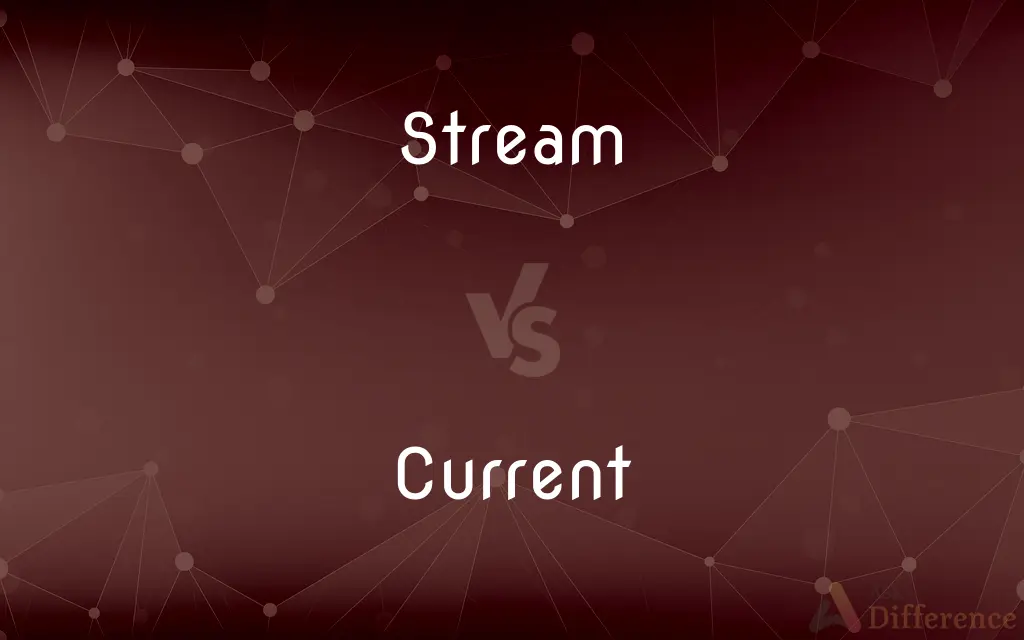Stream vs. Current — What's the Difference?
Edited by Tayyaba Rehman — By Urooj Arif — Updated on March 12, 2024
A stream is a small, narrow river, while a current refers to the flow of water within a larger body of water.

Difference Between Stream and Current
Table of Contents
ADVERTISEMENT
Key Differences
Streams are natural bodies of flowing water, typically found on land, moving continuously in a specific direction. They are characterized by their size, often smaller and narrower than rivers, and can be found in a variety of geographical settings. On the other hand, currents refer to the directional movement of water within seas, oceans, or larger rivers, driven by various factors such as wind, temperature differences, and the Earth's rotation.
While streams contribute to the drainage of water from the land into larger water bodies, currents play a crucial role in the global climate system by distributing heat across the planet. Ocean currents, for example, can significantly influence weather patterns and marine ecosystems far from their origins. Whereas streams are part of the hydrological cycle, affecting local ecosystems and landscapes.
The formation of streams is often influenced by rainfall, snowmelt, and the topography of the land, leading to the creation of channels that direct the flow of water. Currents, in contrast, are influenced by a complex interaction of global factors, including gravitational pull, prevailing winds, and the configuration of the Earth's continents and ocean basins.
Recreationally, streams are accessible for activities such as fishing, kayaking, and hiking along their banks. Currents, due to their scale and power, are more often navigated by larger vessels and considered in marine navigation and planning, with significant currents like the Gulf Stream or the Japan Current affecting shipping routes and sailing conditions.
Both streams and currents are vital to their respective ecosystems, providing habitat, nutrients, and transportation for various species. However, their impact and the scale at which they operate differ significantly, with streams influencing local environments and currents having far-reaching effects on global climate and marine life.
ADVERTISEMENT
Comparison Chart
Definition
A small, narrow river.
The flow of water within a larger body.
Location
Primarily on land.
Within seas, oceans, or large rivers.
Driving Factors
Gravity, land topography, precipitation.
Wind, temperature gradients, Earth's rotation.
Role
Part of the hydrological cycle, draining land.
Influences global climate, marine navigation.
Recreational Use
Fishing, kayaking, hiking.
Navigated by ships, affects sailing conditions.
Compare with Definitions
Stream
A small body of flowing water.
The clear stream wound through the forest.
Current
The movement of water within a larger body.
The strong current swept away unanchored boats.
Stream
A continuous flow of water in a specific direction.
The stream's gentle babble was soothing.
Current
Can be surface or deep-water currents.
The deep ocean current was cold and slow-moving.
Stream
Supports local ecosystems and biodiversity.
The stream was teeming with fish and insects.
Current
Affects the distribution of marine life.
Nutrient-rich currents support diverse marine ecosystems.
Stream
Can be seasonal or perennial, depending on water source.
The desert stream only flows after heavy rain.
Current
Plays a role in marine navigation.
Sailors must account for the current when plotting their course.
Stream
Naturally occurring watercourse, smaller than a river.
They followed a mountain stream down the valley.
Current
Influenced by global forces, affects climate.
The warm Gulf Stream current moderates the climate of Western Europe.
Stream
A stream is a body of water with surface water flowing within the bed and banks of a channel. The flow of a stream is controlled by three inputs – surface water, subsurface water and groundwater.
Current
A body of water or air moving in a definite direction, especially through a surrounding body of water or air in which there is less movement
Ocean currents
Stream
A small, narrow river
A perfect trout stream
Current
A flow of electricity which results from the ordered directional movement of electrically charged particles
This completes the circuit so that a current flows to the lamp
Magnetic fields are produced by currents flowing in the cables
Stream
A continuous flow of data or instructions, typically one having a constant or predictable rate.
Current
The general tendency or course of events or opinion
The student movement formed a distinct current of protest
Stream
A group in which schoolchildren of the same age and ability are taught.
Children in the top streams
Current
Belonging to the present time; present-day
Current events.
Current leaders.
My current address.
Stream
(of liquid, air, gas, etc.) run or flow in a continuous current in a specified direction
She sat with tears streaming down her face
Sunlight streamed through the windows
Current
Being in progress now
Current negotiations.
Stream
Transmit or receive (data, especially video and audio material) over the Internet as a steady, continuous flow.
Current
Commonly accepted or used; prevalent
Current fashions.
Current technology.
Stream
Put (schoolchildren) in groups of the same age and ability to be taught together.
In the coming school year, we were to be streamed
Current
Passing from one to another; circulating, as money or a rumor
Current bills and coins.
Stream
A flow of water in a channel or bed, as a brook, rivulet, or small river.
Current
Running; flowing.
Stream
A steady current in such a flow of water.
Current
A steady, smooth onward flow or movement
A current of air from a fan.
A current of spoken words.
Stream
A steady current of a fluid.
Current
The part of a body of liquid or gas that has a continuous onward movement
Rowed out into the river's swift current.
Stream
A large amount or number moving or occurring in steady succession
A stream of commuters.
A stream of insults.
Current
A general tendency, movement, or course.
Stream
A trend, course, or drift, as of opinion, thought, or history.
Current
A flow of electric charge.
Stream
A beam or ray of light.
Current
The amount of electric charge flowing past a specified circuit point per unit time, usually expressed in amperes.
Stream
Chiefly British A course of study to which students are tracked.
Current
The generally unidirectional movement of a gas or fluid.
Stream
(Computers) A steady flow of data.
Current
The part of a fluid that moves continuously in a certain direction, especially (oceanography) nocap=a.
Stream
To flow in a stream or current.
Current
(electricity) the amount of electric charge flowing in each unit of time.
Stream
To pour forth or give off a stream; flow
My eyes were streaming with tears.
Current
A tendency or a course of events
Stream
To move or arrive in large numbers; pour
Traffic was streaming by. Fan mail streamed in.
Current
Existing or occurring at the moment.
Current events
Current leaders
Current negotiations
Stream
To extend, wave, or float outward
The banner streamed in the breeze.
Current
Generally accepted, used, practiced, or prevalent at the moment.
Current affairs
Current bills and coins
Current fashions
Stream
To leave a continuous trail of light.
Current
(India) Electric; of or relating to electricity.
Current bill
Current shock
Stream
To give forth a continuous stream of light rays or beams; shine.
Current
(obsolete) Running or moving rapidly.
Stream
To emit, discharge, or exude (a body fluid, for example).
Current
Running or moving rapidly.
Like the current fire, that rennethUpon a cord.
To chase a creature that was current thenIn these wild woods, the hart with golden horns.
Stream
(Computers) To transmit or receive (audio or video content), especially over the internet, in small, sequential packets that permit the content to be played continuously as it is being received and without saving it to a hard disk.
Current
Now passing, as time; as, the current month.
Stream
A small river; a large creek; a body of moving water confined by banks.
Current
Passing from person to person, or from hand to hand; circulating through the community; generally received; common; as, a current coin; a current report; current history.
That there was current money in Abraham's time is past doubt.
Your fire-new stamp of honor is scarce current.
His current value, which is less or more as men have occasion for him.
Stream
A thin connected passing of a liquid through a lighter gas (e.g. air).
He poured the milk in a thin stream from the jug to the glass.
Current
Commonly estimated or acknowledged.
Stream
Any steady flow or succession of material, such as water, air, radio signal or words.
Her constant nagging was to him a stream of abuse.
Current
Fitted for general acceptance or circulation; authentic; passable.
O Buckingham, now do I play the touchTo try if thou be current gold indeed.
Stream
All moving waters.
Current
A flowing or passing; onward motion. Hence: A body of fluid moving continuously in a certain direction; a stream; esp., the swiftest part of it; as, a current of water or of air; that which resembles a stream in motion; as, a current of electricity.
Two such silver currents, when they join,Do glorify the banks that bound them in.
The surface of the ocean is furrowed by currents, whose direction . . . the navigator should know.
Stream
(computing) A source or repository of data that can be read or written only sequentially.
Current
General course; ordinary procedure; progressive and connected movement; as, the current of time, of events, of opinion, etc.
Stream
(figurative) A particular path, channel, division, or way of proceeding.
Haredi Judaism is a stream of Orthodox Judaism characterized by rejection of modern secular culture.
Current
A flow of electricity through a conductor;
The current was measured in amperes
Stream
A division of a school year by perceived ability.
All of the bright kids went into the A stream, but I was in the B stream.
Current
A steady flow (usually from natural causes);
The raft floated downstream on the current
He felt a stream of air
Stream
A live stream.
Current
Dominant course (suggestive of running water) of successive events or ideas;
Two streams of development run through American history
Stream of consciousness
The flow of thought
The current of history
Stream
(intransitive) To flow in a continuous or steady manner, like a liquid.
Current
Occurring in or belonging to the present time;
Current events
The current topic
Current negotiations
Current psychoanalytic theories
The ship's current position
Stream
(intransitive) To extend; to stretch out with a wavy motion; to float in the wind.
A flag streams in the wind.
Stream
(Internet) To push continuous data (e.g. music) from a server to a client computer while it is being used (played) on the client.
Stream
A current of water or other fluid; a liquid flowing continuously in a line or course, either on the earth, as a river, brook, etc., or from a vessel, reservoir, or fountain; specifically, any course of running water; as, many streams are blended in the Mississippi; gas and steam came from the earth in streams; a stream of molten lead from a furnace; a stream of lava from a volcano.
Stream
A beam or ray of light.
Stream
Anything issuing or moving with continued succession of parts; as, a stream of words; a stream of sand.
Stream
A continued current or course; as, a stream of weather.
Stream
Current; drift; tendency; series of tending or moving causes; as, the stream of opinions or manners.
Stream
To issue or flow in a stream; to flow freely or in a current, as a fluid or whatever is likened to fluids; as, tears streamed from her eyes.
Beneath those banks where rivers stream.
Stream
To pour out, or emit, a stream or streams.
A thousand suns will stream on thee.
Stream
To issue in a stream of light; to radiate.
Stream
To extend; to stretch out with a wavy motion; to float in the wind; as, a flag streams in the wind.
Stream
To send forth in a current or stream; to cause to flow; to pour; as, his eyes streamed tears.
It may so please that she at length will streamSome dew of grace into my withered heart.
Stream
To mark with colors or embroidery in long tracts.
The herald's mantle is streamed with gold.
Stream
To unfurl.
Stream
A natural body of running water flowing on or under the earth
Stream
Dominant course (suggestive of running water) of successive events or ideas;
Two streams of development run through American history
Stream of consciousness
The flow of thought
The current of history
Stream
A steady flow (usually from natural causes);
The raft floated downstream on the current
He felt a stream of air
Stream
The act of flowing or streaming; continuous progression
Stream
Something that resembles a flowing stream in moving continuously;
A stream of people emptied from the terminal
The museum had planned carefully for the flow of visitors
Stream
To extend, wave or float outward, as if in the wind;
Their manes streamed like stiff black pennants in the wind
Stream
Move in large numbers;
People were pouring out of the theater
Beggars pullulated in the plaza
Stream
Rain heavily;
Put on your rain coat-- it's pouring outside!
Stream
Flow freely and abundantly;
Tears streamed down her face
Common Curiosities
How are streams and currents measured?
Streams are often measured by their flow rate or discharge, while currents are measured by their speed and direction.
Can streams become rivers?
Yes, streams can grow into rivers as they gather more water from tributaries and the surrounding land.
Do currents always flow in the same direction?
Ocean currents have general patterns, but their strength and direction can vary seasonally or due to climatic conditions.
Are all currents in the ocean?
While most notable currents are in oceans, currents can also occur in large lakes and rivers.
Can the course of a stream change over time?
Yes, streams can change their course due to natural processes like erosion or human intervention.
How do ocean currents affect weather?
Ocean currents can transport warm or cold water, influencing climate and weather patterns over land.
Can currents be dangerous?
Yes, strong currents can pose hazards to swimmers, boaters, and marine life.
Can humans influence streams and currents?
Humans can impact streams through activities like damming and pollution. While less directly, human activities like climate change can influence ocean currents.
How do streams originate?
Streams can originate from springs, melting snow, or runoff from rainfall.
What is the significance of the Gulf Stream?
The Gulf Stream is crucial for moderating climates, particularly in Western Europe, making them warmer than other regions at similar latitudes.
Can currents help in ocean navigation?
Yes, sailors often use currents to their advantage to save fuel and time.
Are there different types of streams?
Yes, streams can vary widely, from ephemeral streams that flow only after rain to perennial streams that flow continuously.
Are streams important for ecosystems?
Absolutely, streams provide habitat, nutrients, and water for a variety of organisms.
How are currents affected by climate change?
Climate change can alter ocean temperatures and salinity, potentially disrupting established current patterns.
Do streams contribute to groundwater?
Yes, in some cases, streams can recharge groundwater supplies.
Share Your Discovery

Previous Comparison
Scull vs. Skull
Next Comparison
Ouija vs. PlanchetteAuthor Spotlight
Written by
Urooj ArifUrooj is a skilled content writer at Ask Difference, known for her exceptional ability to simplify complex topics into engaging and informative content. With a passion for research and a flair for clear, concise writing, she consistently delivers articles that resonate with our diverse audience.
Edited by
Tayyaba RehmanTayyaba Rehman is a distinguished writer, currently serving as a primary contributor to askdifference.com. As a researcher in semantics and etymology, Tayyaba's passion for the complexity of languages and their distinctions has found a perfect home on the platform. Tayyaba delves into the intricacies of language, distinguishing between commonly confused words and phrases, thereby providing clarity for readers worldwide.















































